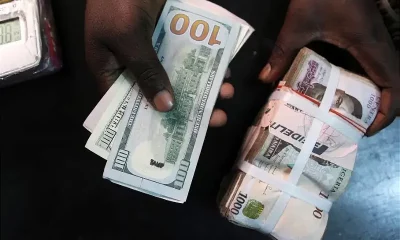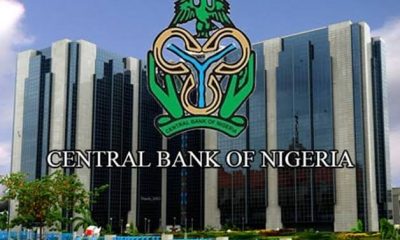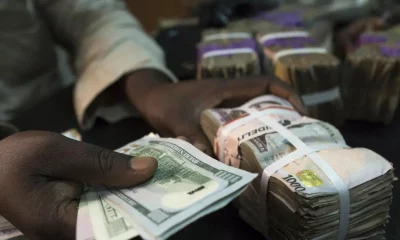News
Naira Scarcity Worsens As Banks Limit Withdrawals, ATMs Run Dry

Naira scarcity is biting harder across the country as banks have limited cash withdrawals, findings by Daily Trust have shown.
Residents of Lagos, Abuja, Kano, Katsina, Jigawa and Adamawa and in other parts of the country are expressing concerns over their inability to withdraw huge cash in their banks, raising fears of scarcity as experienced during the naira swap.
This has also affected business transactions in local markets, especially in the northern part of Nigeria where buyers and sellers prefer to deal in cash instead of bank transfers.
Daily Trust had, on November 1, reported that cash scarcity had resurfaced in Borno and Kano states as the December 31 deadline for the use of the old N200, N500 and N1,000 banknotes draws nearer.
The report had forced the Central Bank of Nigeria (CBN) to explained that “The seeming cash scarcity in some locations is due largely to high volume withdrawals from the CBN branches by Deposit Money Banks (DMBs) and panic withdrawals by customers from the Automated Teller Machines, ATMs).”
The CBN, through its Director, Corporate Communications, Isa Abdulmumin, added, “While we note the concerns of Nigerians on the availability of cash for financial transactions, we wish to assure the public that there is sufficient stock of currency notes for economic activities in the country. The branches of the CBN across the country are also working to ensure the seamless circulation of cash in their respective states of operation.”
The CBN had announced in March that in compliance with the order of the Supreme Court, banknotes remained legal tender alongside the redesigned banknotes until December 31.
Last week, the apex bank reassured that both old and new notes remained legal tender and urged Nigerians to continue transacting using them.
“For the avoidance of doubt, while reiterating that there are sufficient banknotes across the country for all normal economic activity, we wish to state unambiguously that every banknote issued by the Central Bank of Nigeria (CBN) remains legal tender and should not be rejected by anyone, as stipulated in Section 20(5) of the CBN Act, 2007,” Abdulmumin had said in the statement.
He had added that branches of the CBN across the country had been directed to continue to issue different denominations of old and redesigned banknotes in adequate quantities to deposit money banks for onward circulation to bank customers.
Scarcity persists
But checks by our reporters across the country revealed serious scarcity of the naira amid reluctance by traders, farmers, among others to release their wares even when prospective buyers are willing to make bank transfers.
At prominent village markets in Kano, Katsina, Jigawa, Adamawa, Kaduna and Taraba, lack of cash is affecting businesses.
This is at a time when farmers have harvested their goods and taken them to market hoping to sell.
However, merchants who trooped to such markets from the towns to buy the commodities have been mostly stranded as middlemen scramble to get cash for them.
POS operators in such markets also confirmed shortage of cash.
Traders return home with cattle in Katsina
Anas Nasiru, who visited the Mai’adua Cattle Market on Sunday, said it was tough getting cash to transact businesses.
“Most of the people who brought cattle from the villages for sale were not willing to sell because they want cash, which is not available.
“My cousin had to send cash for me from Kano, which I used to buy cattle. It is the same with many people…In fact, some of the traders went back home with their wares,” he said.
A POS operator in Kongolam, a border town with Niger Republic, said he had run out of cash.
“Some people credited our accounts with millions of naira and they have been on the queue for over weeks, we give them cash in piecemeal. I am not an economist but I have a strong feeling the federal government had mopped up cash from circulation,” he said.
Merchants give rewards for cash in Yobe
In Nguru, Yobe State, grain merchants were reportedly ready to give up to N50,000 in reward for anyone who attracts N1,000,0000 cash to them.
This is in addition to the charges they pay.
A resident of the town who gave his name as Sanusi, said people looking for Sesame seed have thronged to the town.
“Farmers in this part of the country produce a lot of sesame seed and have harvested it. Willing buyers are here but are having challenges getting cash.
“Some middlemen are now making a fortune from the scarcity because they get N50,000 for each facilitation of N1,000,000,” he said.
ATMs dry in Lagos
In Lagos, one of our correspondents, who checked some commercial banks in parts of Ikeja at the weekend, observed that most of the banks’ Automated Teller Machines (ATMs) had run out of cash.
This has left many people to resort to patronising Point of Sale (PoS) agents who are also complaining that they could not withdraw sufficient cash from their banks.
At the Tafawa Balewa Square (TBS), venue of the International Trade Fair in Lagos, some PoS agents confirmed the development to our correspondent.
Simisola Adedeji, the owner of Capricorn Digital Payment Solutions, decried that “It has been tough withdrawing huge volumes of money in banks and what we are hearing is that they want to withdraw the old currency. We only plead that we should not experience the scarcity witnessed during the cash swap because many people lost their lives.”
A Lagos resident, who identified himself simply as Mr. Chukwuemeka, said, “I went to many banks and they were not dispensing money. I went all the way from Ogba to Ikeja at Oba Akran before I was able to withdraw in a bank.”
He stated that many PoS agents had been withdrawing all the cash lodged at various ATMs.
“Immediately the bank loaded money on the ATM, they (POS agents) are the first people to know, they would just use their cards to withdraw the money, that is what most of them normally do.
“I had to trek a long distance, going from one place to another until I got to Oba Akran where I was able to withdraw.”
A Bureau de Change operator in Abuja, Gidado Bala, said, “Although BDCs rarely use physical cash for transfer these days, banks have begun limiting huge cash withdrawals and it may be because of the deadline of December but we don’t know,” he said.
Gidado noted that “BDC operators usually get cash in minimal quantities at the banks.”
A store owner, Chukwu Ani, said he had to limit cash transactions with suppliers as customers rarely come with physical cash and “banks hardly give the required cash withdrawals,”
He added, “We don’t understand the situation and we hope it won’t be the situation of this year where we suffered for cash.”
A grain merchant, Sani Kamba said even though he was able to get some cash with a view to coming to North to buy grains, he was intercepted by law enforcement agents at the airport.
“They carried out an investigation but concluded that we are out for a legitimate business. They checked our accounts and discovered that we deposit and withdraw all the time.
“I pray the federal government does something to address the scarcity,” he said.
A banker, Aliyu Hameed said supply was low, hence the shortage.
On why traders, especially in village markets don’t accept transfers, he said, “Many of them, especially in the North have been short-changed by some unpatriotic elements.
“It has happened several times, especially during the cash crunch in February and March. Some dubious people would make phantom transfers to the traders, especially in the villages and by the time they go to the bank, nothing in their accounts.
“It has also been difficult for such people to lodge complaints in banks because apart from telephone numbers of the people to dupe them, there is nothing to show as evidence,” he said.
POS operators double charges in Kano
In Kano, there are indications that the scarcity of naira notes is getting worse.
Many of the PoS operators in Kano metropolis have doubled their charges when they have the cash to give; while others ration the amounts they give in order to meet demands from customers.
One of them, Mohammed Kutama, said the scarcity is real, but that he goes the extra mile to get the needed cash to meet demands of his customers.
According to him, this comes with extra charges as he is now charging N200 per N10,000 withdrawal as against the previous charge of N100 on the same amount of withdrawal.
Kutama explained that he often gets cash from a filling station his friend is managing and a viewing centre where people usually pay cash.
Nura Umar, who operates a provisions store in Kano, said the naira scarcity was affecting his business.
He said though he was using e-payment platforms for transactions, it took time to go through because of network glitch.
He alleged that the scarcity of cash was as a result of the CBN’s inability to narrow the supply gap.
The story is however different at Hamza Abdullahi’s shop who runs PoS and mobile phone recharge cards business. He told one of our correspondents that he had not increased his charges because he was getting cash payment from recharge cards sales.
Most of the ATMs in some banks located along Zoo Road in Kano were not dispensing cash when one of our correspondents visited.
No customer was sighted at Unity Bank, Jaiz, Taj and Fidelity Banks’ ATMs. Only two customers were seen at a Zenith Bank’s ATM trying their luck.
No cash in Adamawa markets
In Tunno, a village famous for rice paddy in Adamawa State, merchants also struggle for cash to buy the product.
Salihu Aliyu, who visited Tunno, said there was bumper harvest from the farmers and some middlemen are insisting on cash.
“It is actually hunger in the midst of plenty. There are enough rice paddies here to buy but very few of the owners accept bank transfers, most of them prefer cash.
“The government should commission a study on why people, especially in the North, prefer cash transactions.
“For me, I believe there are no banks in many communities, and there is also a low level of education in rural communities,” he said.
Daily Trust reports that there was no update from CBN on the continued cash crunch despite the assurance that both old and new notes remain legal tender.
News
Woman killed while crossing road in Anambra

The Federal Road Safety Corps (FRSC), Anambra State Sector Command, has confirmed the death of a woman in an accident at Okpoko Market on the Asaba-Onitsha Road.
The Sector Commander, Mr Adeoye Irelewuyi, who confirmed the accident to journalists in Awka on Thursday, said that the woman was hit while she was crossing the road.
He said that the accident, which occurred on Wednesday, involved a commercial tow truck with registration number XA550BMA.
“Eyewitness report reaching us indicates that the truck was towing a vehicle in an uncontrollable speed along the axis.
“The vehicle that was being towed got detached from the tow truck.
“It hit and killed a female adult, who was said to be crossing the road, while the tow truck continued its movement.
“FRSC rescue team came to the scene and took the woman to Toronto Hospital, Onitsha, where she was confirmed dead and her body deposited at the hospital’s mortuary,” he said.
While sympathising with the family of the dead, the sector commander urged motorists, especially tow truck drivers, to exercise a high level of professionalism.
He also urged the drivers to always use standard equipment and avoid speeding.
News
LASG’s maize palliative impactful, says poultry association chair

The Chairman, Poultry Association of Nigeria (PAN), Lagos State Chapter, Mr Mojeed Iyiola, said the state government’s maize palliative to members of the association made a positive impact on the sector.
Iyiola said this in an interview with the News Agency of Nigeria (NAN) on Thursday in Lagos.
“We received about 150,000 tons of maize in February from the Lagos State government as palliative to cushion the effect of high feed prices.
“The major benefit of the palliative is that it actually cushioned the cost of production for most poultry farmers in the state.
“The palliative was beneficial as it made the cost of some poultry produce, especially eggs to drop,” Iyiola said.
He noted that prior to the palliative, a crate of egg was sold between N3,500 and N3,700 at the farm gate, but after the palliative, it now sells between N3,200 and N3,400.
According to the PAN chair, retailers and middlemen who sell from N3,800 to N4,200 do that for their personal gain.
“We have urged our members to sell their eggs at reasonable prices following the receipt of the palliative from the government.
“We appreciate the Lagos State government for the palliative but we also urge the federal government to do likewise, to further reduce the cost of production in the sector.
“This will consequently lead to drop in the prices of all poultry produce across board,” he said.
He said the palliative was shared among financial members of the association at no extra cost.
“As an association we shared the grains equally across PAN’s eight zones in the state equally. We also mandated each zone not the sell even a grain of the maize.
“We, however, considered new poultry farmers who wanted to the join the association as beneficiaries of the palliative,” said Iyiola.
He noted that through the palliative, more poultry farmers were recruited into the association.
“The maize was shared only to poultry farmers and not feed millers, it is the major component of poultry feed formulation,” he said.





















